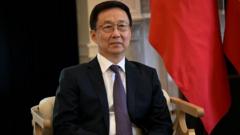In a historic first, Han's attendance at Donald Trump's inauguration reflects China's eagerness to navigate future relations, despite expected challenges.
**China's Diplomatic Gesture: Vice-President Han Zheng to Attend Trump's Inauguration**

**China's Diplomatic Gesture: Vice-President Han Zheng to Attend Trump's Inauguration**
China's decision to send Vice-President Han Zheng to the inauguration marks a significant diplomatic move as Trump prepares to take office.
China is making a notable diplomatic gesture by sending Vice-President Han Zheng to the inauguration of President-elect Donald Trump, a first for a senior Chinese leader at such a ceremony. Trump's invitations to world leaders, including Xi Jinping, break away from the norm of foreign leaders typically avoiding presidential inaugurations. Despite uncertainties reigniting tensions with tariffs and new policies, China aims to build ties with the incoming administration to establish a positive working environment.
Analysts see Han's role as representative as both a strategic move and a cautious approach from Xi Jinping, who has historically chosen proxies rather than attending high-profile events himself. While Xi has never participated directly in a presidential inauguration, Han is viewed as a significant figure, often involved in foreign affairs and trade initiatives like the Belt and Road Initiative. This diplomatic engagement may serve to pave the way for constructive US-China dialogue.
Han's attendance hints at China's acknowledgment of the importance of US leadership, albeit with a degree of distance as his position does not place him among Xi's closest allies. The invitation to Trump by various global leaders illustrates his desire to cultivate relationships even with competitors, with the implicit aim of establishing leverage over Xi’s governance style. Observers speculate that sending Han instead of a more prominent figure illustrates China's strategy to manage US ties while safeguarding against potential fallout.
The backdrop of this diplomatic overture rests on the complex interplay of US-China relations beset by trade issues and political rivalry. As the world watches, the future of collaboration between these two global powers hangs in the balance, hinging on the outcomes of Trump's inaugural strategies and Han's forthcoming attendance.
Analysts see Han's role as representative as both a strategic move and a cautious approach from Xi Jinping, who has historically chosen proxies rather than attending high-profile events himself. While Xi has never participated directly in a presidential inauguration, Han is viewed as a significant figure, often involved in foreign affairs and trade initiatives like the Belt and Road Initiative. This diplomatic engagement may serve to pave the way for constructive US-China dialogue.
Han's attendance hints at China's acknowledgment of the importance of US leadership, albeit with a degree of distance as his position does not place him among Xi's closest allies. The invitation to Trump by various global leaders illustrates his desire to cultivate relationships even with competitors, with the implicit aim of establishing leverage over Xi’s governance style. Observers speculate that sending Han instead of a more prominent figure illustrates China's strategy to manage US ties while safeguarding against potential fallout.
The backdrop of this diplomatic overture rests on the complex interplay of US-China relations beset by trade issues and political rivalry. As the world watches, the future of collaboration between these two global powers hangs in the balance, hinging on the outcomes of Trump's inaugural strategies and Han's forthcoming attendance.





















